It’s when times get tough that a community finds its strength. In 2020, amid the challenges of a global pandemic and an uncertain economy, local government, organizations and businesses found success through cooperation.
Supporting Local Business
 Recently named the National Chamber of the Year, the Ocala/Marion County Chamber and Economic Partnership (CEP) found its role in supporting local businesses more important than ever in a challenging pandemic economy.
Recently named the National Chamber of the Year, the Ocala/Marion County Chamber and Economic Partnership (CEP) found its role in supporting local businesses more important than ever in a challenging pandemic economy.
“Remarkably, 2020 was an incredible year,” says CEO Kevin Sheilley, noting growth through national companies, including Amazon and Dollar Tree, which are opening warehouses in Marion County, and a strong entrepreneurship initiative for local residents.
The Get. Gather. Go. initiative was the CEP’s greatest success this year, Sheilley says.
“Part of our purpose as an organization is to be the voice of the business community and one-stop shop,” he explains. He believes the information consolidated through the initiative helped one out of every four businesses receive a Paycheck Protection Program loan, which he calls an example of great partnerships and a key reason our community has “rebounded so strongly.”
Sheilley credits the adaptability of the CEP’s staff for fulfilling its mission of being a catalyst for a prosperous community.
“Our word for 2020 is ‘pivot’ and the CEP team did exactly that throughout the entire year,” he says. “They have continued to be innovative, open and creative to make sure they are meeting the needs. They all love this community and take great pride in its success.”
Supporting Nonprofits
In the past few years, the Community Foundation for Ocala/Marion County has flourished under the leadership of Executive Director Lauren DeIorio, and the organization was ready to support local nonprofit organizations when donations slowed down this spring.
“Our motto is ‘Building a stronger community…one passion at a time,” DeIorio says. “We have continued to be advocates for nonprofits as well as connecting donors and professional advisors to the causes that matter most to them.”
When COVID-19 hit, the Community Foundation moved its Nonprofit Academic Series, a partnership with the Edyth Bush Institute for Philanthropy & Nonprofit Leadership at Rollins College Crummer Graduate School of Business, to an online format to make sure nonprofit staff still had access to valuable training.
Through a partnership with Ocala Fire Rescue and AdventHealth Ocala, the foundation launched the Community Paramedicine program in April. In November they released the NonProfit Business Council’s Guide to Charitable Giving 2021-2022.
Currently, the Community Foundation is working through the Coronavirus Aid, Relief, and Economic Security (CARES) Act funding to administer Stronger Marion Nonprofits grants and, in October, they organized our community’s first online day of giving, Give4Marion, which raised more than $310,000 for 81 local charities.
“Our mission has stayed the same,” DeIorio says. “We’ve just adapted how we administer it.”
Embracing Technology for Customer Service
Used to providing face-to-face customer service, the banking industry learned to embrace technology in a bigger way this year.
“We’ve never had a playbook for how to run a bank during a pandemic,” says Rusty Branson, CenterState Bank community president. “We feel very fortunate that we learned how to adapt and deliver our services a lot differently than we used to—electronically—and have been able to adapt to that and focus on our customers without really sacrificing customer service.”
Branson credits the bank’s IT vendors and staff for figuring out how to empower employees to work from home, and he says patient customers “who were reluctant to use online banking” embraced it and “sped up their learning curve on how to bank that way.”
With bank lobbies opened back up for in-person transactions, Branson says electronic options are “the new lay of the land” and at least “the way to do some of your banking.”
He credits the CEP and local government with the “significant amount of momentum that we built up.”
“If you look at the unemployment right now in Marion County compared to the state and the nation, we’re very stable,” he observes. “Ocala is a very resilient community when it comes to the economy. We’re more diversified now and the economic sectors we’re involved in. I believe we’re in a very good place to move into 2021 and hopefully start to come out of this pandemic, to continue this momentum and fully move Ocala/Marion to new heights.”
Introducing Online Bidding for Thoroughbred Sales
Technology was the way Ocala Breeders’ Sales (OBS) was able to move forward with thoroughbred sales after spring sales were moved to the summer.
 “We instituted online bidding,” explains Tod Wojciechowski, OBS director of sales. “We were the first sales company in the United States to have internet bidding on a live auction. The circumstances kind of forced our hand on that and it’s something that went extremely well and will remain part of the auction landscape going into the future.”
“We instituted online bidding,” explains Tod Wojciechowski, OBS director of sales. “We were the first sales company in the United States to have internet bidding on a live auction. The circumstances kind of forced our hand on that and it’s something that went extremely well and will remain part of the auction landscape going into the future.”
Virtual bidding “provided a unique avenue for buyers who were unable or unwilling to travel…or just chose to bid this way.”
The pandemic may have caused a very small decline in the influx of young stock for training, Wojciechowski acknowledges, but says “given the current state of the world, things went pretty well” and “with all of the challenges there were certainly some bright spots and some nice horses sold well.”
The future remains bright for Ocala’s thoroughbred industry, he predicts.
“Ocala is still the major training center for young thoroughbreds in the industry and in the country. It’s by far the largest in not only the preparation of horses for auctions in the spring but also for horses getting their early tutelage and early training for racing.”
Adapting, Expanding and Increasing Opportunities
The City of Ocala didn’t slow down this year, opening the new Ocala International Airport General Aviation Terminal, the Ocala Wetland Recharge Park, the MLK First Responder Campus and the Archeology Center at Fort King National Historic Landmark, while simultaneously overseeing five new public art murals adding beauty to downtown.
“COVID-19 has brought a set of very unique and unprecedented challenges to city governments everywhere,” says Ocala City Manager Sandra Wilson. 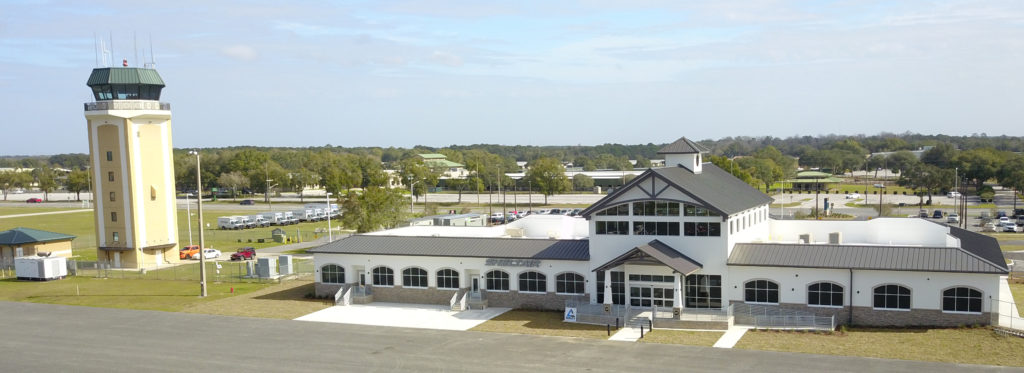 “I am incredibly proud of how the entire City of Ocala workforce was able to quickly and seamlessly adapt to those challenges and new limitations without sacrificing the high standards for outstanding customer service our citizens and visitors have come to expect.”
“I am incredibly proud of how the entire City of Ocala workforce was able to quickly and seamlessly adapt to those challenges and new limitations without sacrificing the high standards for outstanding customer service our citizens and visitors have come to expect.”
The city implemented live, online access for city council meetings and, where able, successfully transitioned staff to telework while city buildings were closed. Using CARES Act funds, the city installed sanitization equipment and employed increased sanitization methods in buildings to ensure the safety of citizens and staff.
Now, city leaders are “really excited” about the city council’s vision to create the Targeted Local Hire Program, which provides an alternative pathway to careers with the City of Ocala in the form of on-the-job training. The program focuses on hiring and retaining Ocala residents from the underserved community of West Ocala with the objective of creating a steady cycle of candidates who will receive necessary job training and investing in individuals seeking the skills needed in today’s job market.
Meeting Community Needs
Marion County government never closed its doors or stopped providing services to citizens, even at the height of the pandemic, with nearly every department innovating to ensure services were still rendered, calls were still answered and the needs of the community were met.
In a statement, Marion County officials commented, “We’re extremely proud of the way our county employees were able to rally and respond to make sure our critical services were never interrupted. We will never stop working to deliver our residents the best service possible.”
Marion County Facilities Management in particular worked hard to keep the highest-risk environments disinfected. Fortunately, many of the county’s 300 buildings already had ultraviolet light air purification systems in place and facilities experts quickly vetted and procured new sanitation solutions for several county locations, including courtrooms, libraries and the county jail.
Using CARES Act funding, Marion County Community Services representatives continue to assist residents who experienced lost income or incurred additional expenses due to the pandemic and need financial assistance.
Providing Care With Bravery and Compassion
Technology and a supportive community were key for medical providers working hard to care for patients while dealing with the COVID-19 pandemic, according to Ocala Health CEO Chad Christianson.
“The complications of the COVID-19 pandemic was a catalyst to furthering the healthcare industry’s launch into new technologies,” he explains. “Throughout the pandemic with COVID-19 front and center, let’s not forget that there were still people needing care for other health care issues—residents were still in need of emergency care for symptoms of stroke and heart attack; trauma care was still being provided; patients with long-term care issues still needed to access their physicians and support groups.” He explains that expanding their telehealth platform allowed patients to see their loved ones with visitor restrictions in place.
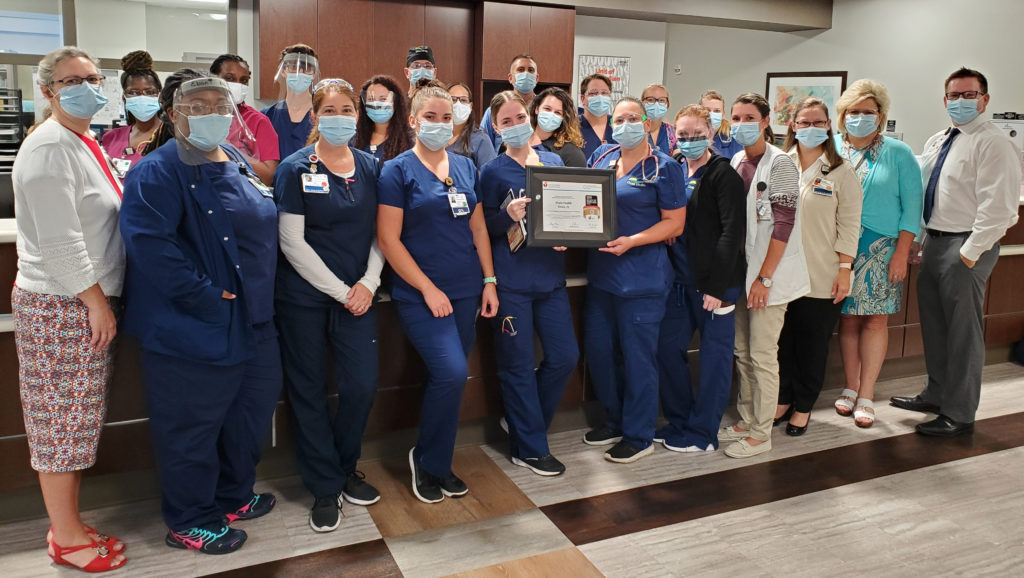 It would have been easy to get swept up into the chaos during the early days of COVID-19, Christianson acknowledges, but says their team “remained focused on providing high-quality care to our patients.”
It would have been easy to get swept up into the chaos during the early days of COVID-19, Christianson acknowledges, but says their team “remained focused on providing high-quality care to our patients.”
Ocala Health opened its Trailwinds Village ER in Wildwood this year and continued to expand the facilities at Ocala Regional and West Marion. Along with many other awards, this year Ocala Health received the American Heart Association/American Stroke Association’s Get With The Guidelines-Stroke Gold Quality Achievement Award, which Christianson credits to the hard work of their staff and many community partners.
“Without hesitation in a time of so many unknowns, our care teams stepped up to serve our communities with bravery and compassion,” he says. “Pushing themselves to new heights, they exemplified what it means to care like family. The private and public sector—from government to small businesses to area hospitals, along with hundreds of community volunteers, banded together with gracious hearts and determined minds to support our area.”
Caring For Our Community
In what they call a “year of tremendous challenges” AdventHealth Ocala cared for not just patients who received treatment, but others in need across Marion County as well.
“Even in the most challenging of times we never wavered in putting our patients, our community and our team first,” says President and CEO Joe Johnson. “COVID-19 presented us with enormous challenges to ensure the safety of our patients, staff and community. Through it all, however, we learned the value of innovation and reliance on each other to get through the most difficult times.”
This year, AdventHealth Ocala opened a dedicated emergency room (ER) for expectant mothers and renovated the postpartum unit. Partnering with Ocala Fire Rescue, they launched the Community Paramedicine program to help frequent ER visitors get the right care at the right time. To respond to the needs of coronavirus patients, they created a dedicated 52-bed COVID-19 unit.
With a mission of “extending the healing ministry of Christ,” the AdventHealth Ocala team provided more than a dozen local nonprofits with food for families in need. At Paddock Mall’s annual backpack drive, they provided masks, sanitizer and temperature checks. In partnership with the City of Ocala, AdventHealth helped renovate the Ed Croskey Recreation Center.
Johnson says demonstrations of support from the community went a long way in keeping spirits up among hospital staff.
“We were so encouraged with the support of our Marion County Emergency Operations Center, Health Department and the amazing cards, letters, gifts of food, prayers and car parades from our community. Adversity helped to define the resiliency and dedication of our medical community and our staff. It helped to solidify our determination to further our mission and follow through on our promise to elevate health care.”
Working Towards Pandemic Mitigation
Ocala general practitioner David Kuhn, M.D., of Trinity Clinic, says he “never intended to be a disaster response specialist.” But when he had to close the clinic and move to telehealth services in March, he saw a lot of fear and anxiety in his patients worried about COVID-19. He began to film a daily documentary at the clinic and post it online to help ease their worries, but knew there was more he could do to help the community. He set up Trinity Clinic as one of the first COVID-19 testing sites in Marion County while test kits were still hard to get. By the end of April, the clinic had shifted to providing free testing exclusively for doctors, nurses and other health care workers.
“We were honored to help them,” he says. “The real heroes are the people risking their own lives—the nurses, doctors, respiratory specialists, janitorial staff…everybody in the hospitals.”
Kuhn felt it was important to raise awareness about the virus and “get Ocala to think local.” Using his connections with hospitals and the Florida Department of Health in Marion County, he freely disseminated information to the community and was very forthcoming with the media. He began to post daily updates with coronavirus numbers and graphs on social media. He worked with hundreds of other local doctors through their WhatsApp chat group to share information and to urge the Ocala City Council to pass mitigation strategies such as a mask ordinance.
“Even though masking has been a controversial thing, I think it was a good thing. That was a victory this year for sure,” he notes. “I think it really started to steer the behavior of people in our area towards mitigation. And anything to raise awareness to help in that cause ultimately will lead to less spread and it did.”
Kuhn says the technology resources that helped us through a pandemic year will be the positive takeaways that improve health care going forward. Telehealth has improved access to care, especially for patients in rural areas, he notes, and adds that the WhatsApp group helped local doctors establish “a closer relationship than we’ve had for many, many years in our area” which “will benefit us long term, even after this whole thing is over, and that’s a good thing.”
Responding in Real Time
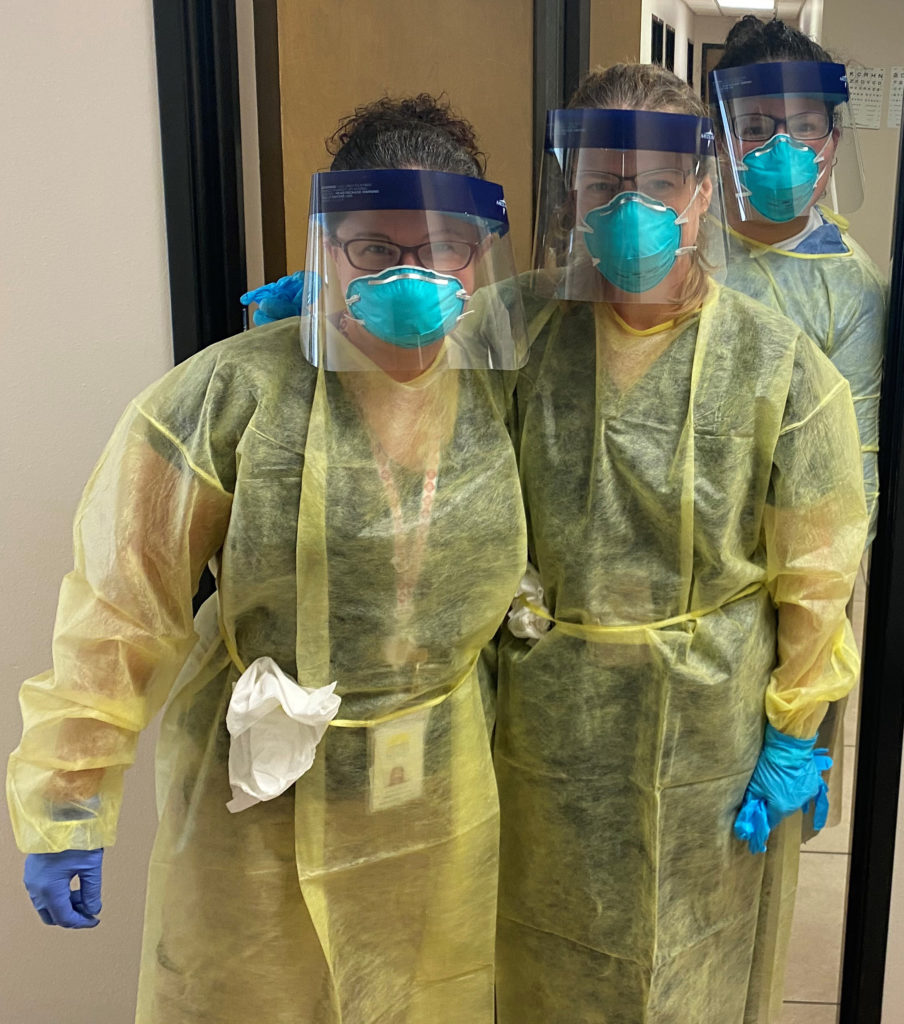 The Florida Department of Health in Marion County has a big job under normal circumstances—providing our community with a huge spectrum of wellness services, from WIC nutrition programs for mothers and children in need to immunizations for school children to hepatitis and HIV prevention and so much more. Then, in the pandemic, the department was named the area’s lead response agency.
The Florida Department of Health in Marion County has a big job under normal circumstances—providing our community with a huge spectrum of wellness services, from WIC nutrition programs for mothers and children in need to immunizations for school children to hepatitis and HIV prevention and so much more. Then, in the pandemic, the department was named the area’s lead response agency.
The department led public COVID-19 testing and contact tracing efforts and set up a local hotline, taking more than 50,000 calls related to the coronavirus and distributing nearly 300,000 free, reusable masks to residents.
“Some of our jobs literally became 100 percent COVID,” explains Administrator Mark Lander, who says managers including himself worked weekends entering data so they could provide the most up-to-date information to the community. And they did it while not just keeping up with all of their other programs, but also winning the National Association of County and City Health Officials’ Promising Practice Award for their school-based teledentistry program and being recognized for their school health diabetes education program.
Lander, who has worked in public health for 30 years, admits they have “done multiple training exercises over the years on how to handle a pandemic but it is definitely a different story when you’re actually living it.” He credits the health department’s “fantastic community partnerships” with agencies including Ocala Fire Rescue and Marion County Fire Rescue and Emergency Management for helping them reach all corners of the community.
“It’s been an honor that we were called to serve as the lead agency in this ongoing crisis.”
Community at a Crossroads
Undeterred by challenging circumstances, Jennifer Hunt Murty, the publisher of Ocala Style, launched Magnolia Media Company’s new weekly community newspaper, the Ocala Gazette, in July. Its mission is to inform and uplift readers by reporting on the events, issues and stories that shape Ocala with accuracy, fairness and passion, and also to serve as a forum where all voices can be heard and to chronicle our community’s history.
The Gazette allows our team to continue our award-winning coverage of the community and gives us a fast-breaking outlet to carry the news and report stories that are outside the scope of the magazine.
In October, this coverage included multiple stories on the tragic death of beloved Ocala Police Chief Greg Graham in a fatal airplane accident.
“He loved being the chief of the Ocala Police Department,” one article quoted Marion County Sheriff Billy Woods. “He loved Ocala and Ocala loved him.”
Friends and colleagues described Graham’s personal standards as “do the right thing” and “treat people the way you would want to be treated.”
At his funeral, it was announced that the Marion County Hospital District board had voted to name part of the new Beacon Point mental health facility The Greg Graham Recovery Center, recognizing the city’s opioid amnesty initiative, started by Graham about three years ago. The program allows anyone with an opioid addiction problem to contact any police offer to ask for treatment and to receive it, no questions asked.
Moving into the new year, both Ocala Style and the Ocala Gazette remain committed to sharing an authentic representation of the city we love and call home, finding success through cooperation with our community partners.
Making Public Art a Priority
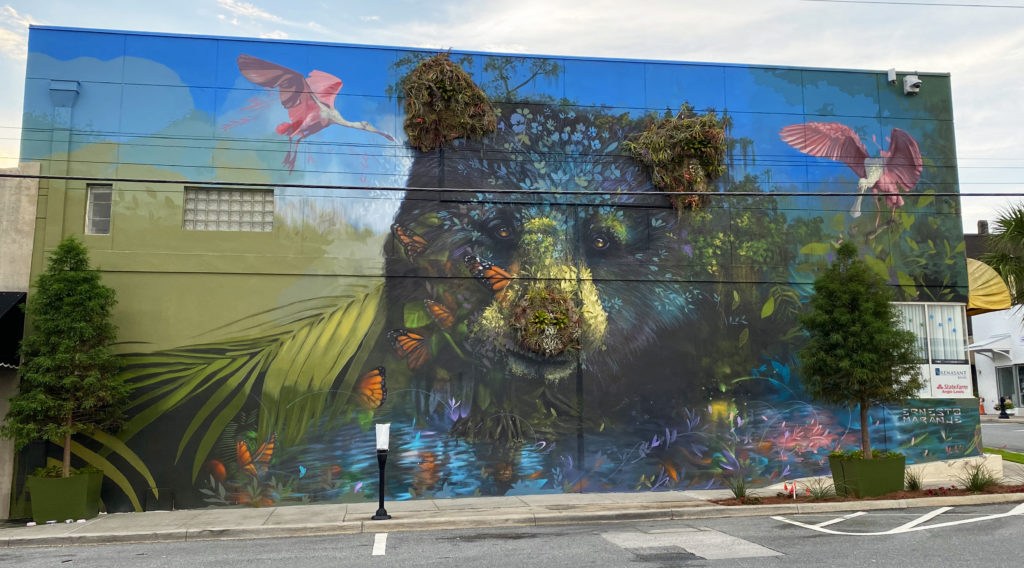 Throughout history, the arts have provided solace to communities in crisis, and Ocala is fortunate to have a Cultural Arts Division committed to making public art a priority. This year the City of Ocala Cultural Arts Division oversaw 30 completed public art projects including large-scale downtown murals. After being shut down to comply with pandemic restrictions, the popular First Friday Art Walk resumed in September and the Discovery Center opened its Astronaut Academy exhibition in October. There are currently three Art in City Spaces galleries open, and Division Head Laura Walker says the community can look forward to 11 projects currently in process as well as expanded programs for public school students to learn more about local arts, history and science.
Throughout history, the arts have provided solace to communities in crisis, and Ocala is fortunate to have a Cultural Arts Division committed to making public art a priority. This year the City of Ocala Cultural Arts Division oversaw 30 completed public art projects including large-scale downtown murals. After being shut down to comply with pandemic restrictions, the popular First Friday Art Walk resumed in September and the Discovery Center opened its Astronaut Academy exhibition in October. There are currently three Art in City Spaces galleries open, and Division Head Laura Walker says the community can look forward to 11 projects currently in process as well as expanded programs for public school students to learn more about local arts, history and science.
“We were able to fulfill our mission to ‘provide an outlet for lifelong learning, enliven public spaces and instill prideful community spirit’ through an integrated approach,” Walker notes. “Our greatest successes during this roller coaster of a year have been the ability to continue supporting artists through projects and the addition of more virtual programming. The ability of our local arts agencies and artists to adjust and grow during a time of uncertainty has been refreshing.”
Bringing Art to All
While closed to the public from mid-March through mid-October, the Appleton Museum of Art team worked on enhancing their digital offerings including the Teaching Tuesday instructional art project video series for children and the Art Minutes video series highlighting their art collection. 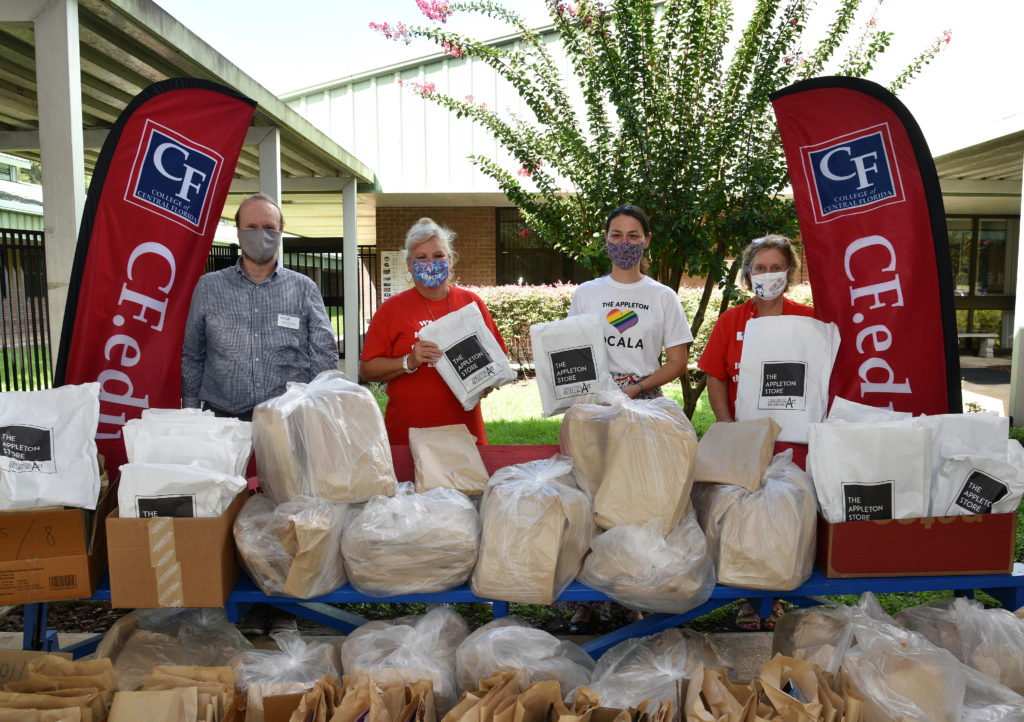 The museum’s free mobile app won a Southeastern Museum Conference 2020 Technology Competition Gold Honors Award. Appleton staff also delivered 3,000 free art kits to Marion County youth through partnerships with schools and community organizations.
The museum’s free mobile app won a Southeastern Museum Conference 2020 Technology Competition Gold Honors Award. Appleton staff also delivered 3,000 free art kits to Marion County youth through partnerships with schools and community organizations.
Currently, the museum is finalizing designs to extend the outdoor sculpture walk and preparing to open the Memories and Inspiration: The Kerry and C. Betty Davis Collection of African American Art in January.
“Bringing art and communities together is at the heart of the Appleton’s mission,” explains Director Jason Steuber.
Looking Toward the Future
As the CEO and Artistic Director for the Reilly Arts Center and an Ocala City Councilman Matthew Wardell says he’s “extremely optimistic about our community and specifically about the success and impactful work of our nonprofit organizations” after facing the challenge of the pandemic and an unpredictable economic climate in 2020.
“In our corner of the nonprofit realm, I’ve seen arts organizations support one another, work together for common causes, and truly become stronger together than they ever were apart,” Wardell says. He says “being open to new ideas and change” was key. “I’ve seen organizations have to move their fundraisers online and end up more successful than ever. I’ve seen performers and venues work together to produce new types of content and find larger audiences than they ever had before. We’ve seen so much transition, quick thinking and successful pivoting that it makes you wonder if we’ll ever go back to some of the perceptively stagnant ways we had before.”
At the Reilly, Wardell says, they’ve “found energy in providing a spark at the Marion Theatre” and, “thanks to some incredible donors and supporters,” are moving forward with our expansion plans to double the size of the arts center.
“We have found success because of the challenges 2020 forced upon us,” he says. “We are working together. We are open to new ideas. We are doing things for the right reasons. We’ve grown tremendously as a community. We should find comfort in the cracks of 2020 and continue to push forward, pursuing an even greater 2021—I know it’s going to be wonderful.”






